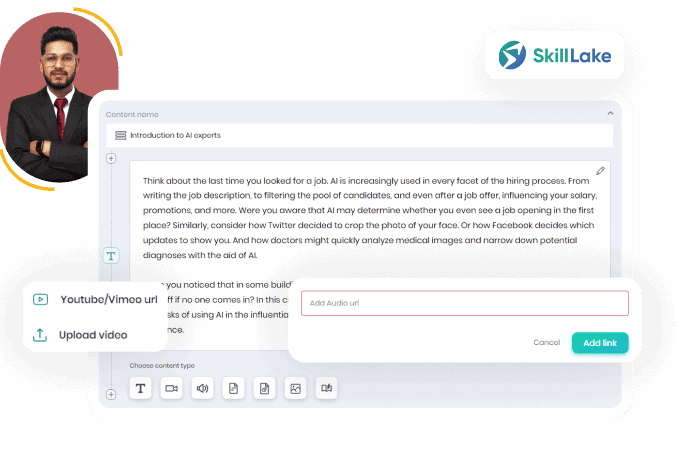Five Ways Skills-Based Talent Management Can Bolster Up DEI Initiatives

Diversity, equity, and inclusion (DEI) initiatives have recently come under fire and are at the center of fierce political debates in many countries. Attracting a diverse workforce has never been more important for companies, especially for those who want to hire and retain the best and brightest candidates.
According to McKinsey, companies with the most ethnically diverse executive teams are 33% more likely to experience industry-leading profitability by outperforming their peers.
In a recent Monster survey, 83% of Gen Z candidates said that a company’s commitment to DEI is important when choosing an employer. Diverse and inclusive workplaces earn more trust and commitment from their employees.
What can your organization do to promote diversity, equity, and inclusion in the workplace? And how can skills-based talent management support and accelerate your DEI initiatives? Start by understanding what DEI means for your workforce.
What is Diversity, Equity, and Inclusion?
Diversity, equity, and inclusion (DEI) is an organizational framework that seeks to promote the fair treatment and full participation of all people, particularly groups that have historically been underrepresented or subject to discrimination on the basis of identity or disability.
As a discipline, DEI refers to the policies, programs, and practices designed to make people of diverse backgrounds feel welcome and ensure they have support to perform to the fullest of their abilities in the workplace.
The three interconnected concepts – diversity, equity, and inclusion – work together to create an environment of respect and fairness.
- Diversity: Diversity refers to the differences represented within a given setting. In the workplace, diversity can mean differences in age, gender, race, ethnicity and cultural backgrounds, identity, sexual orientation, socio-economic class, physical ability, neuro-diversity, and so on.
- Equity: Equity refers to fair treatment for all people so that the workplace norms, practices, and policies provide impartial, fair, and equal possible outcomes for every individual.
- Inclusion: Inclusion refers to how employees feel a sense of belonging in the workplace and the extent to which organizations embrace all employees and help them make meaningful contributions.
To bring DEI values to life, companies must implement programs and initiatives that actively make their workplaces more diverse, equitable, and inclusive.
Importance of Diversity, Equity, and Inclusion in The Workplace
DEI promotes healthy communities and places of work that are free of stereotyping and mistreatment. Equitable employers who respect the unique needs, perspectives, and potential of their diverse workforce are in a better position to outpace their competitors.
There are several reasons DEI is important:
- Diverse talent pool: Hiring candidates from diverse backgrounds allows employers to access a wider and under-tapped talent pool.
- Greater innovation and creativity: DEI can provide you with a broader perspective for problem-solving and help build creative and innovative solutions for a competitive advantage and greater success.
- Higher employee engagement: DEI plays a significant role in ensuring employee satisfaction, positive workplace morale, motivation, and productivity, leading to better business outcomes.
- Stronger company culture: Engaging with people from diverse backgrounds and experiences will make your employees feel positive about the workplace. It also helps in creating a sense of greater belonging.
- Better customer alignment: When employees know their diversity is being represented and understood, they are more likely to understand target customers. Marketing efforts that reflect diverse workforce backgrounds will help you build deeper connections with customers and better understand their needs.
- Improved employee retention: An inclusive work environment helps reduce employee turnover. When your employees understand they are valued and their voice is heard, they will stay with your company longer. Diversity, equity, and inclusion empower your employees to take pride in their work and the company.
Five Ways Skills-Based Talent Management Can Support DEI Initiatives
1. Reduce bias in hiring process
DEI-based hiring policies and practices can reduce bias as much as possible in the candidate selection process and create a more diverse talent pool with the skills required to drive business success. An inclusive and equitable hiring process will create more opportunities for a diverse pool of job candidates.
Companies should ensure that all members of their hiring staff receive anti-bias training that will help reduce the effects of unconscious bias in hiring. Employers should ensure that their hiring staff follow all defined hiring protocols and comply with the required regulatory standards in the candidate assessment and selection process.
2. Establish an inclusive workplace culture
Skills-based talent management boosts employee engagement, productivity, inclusivity, and equity. When employees feel valued at their workplace, they are less likely to leave the company.
Corporate learning and development programs that provide skills-based career paths and resources for reskilling and upskilling will give employees opportunities for career advancement within the company.
Skills-based workforce training programs demonstrate how the organization nurtures a workplace culture that values its people and is willing to invest in them.
3. Provide career advancement opportunities
Through well-defined roles and career paths and skills-based training programs, you can help your existing workforce make internal career advancements. When employees have clear paths to move from less important to more important skills and roles, you can retain a diverse workforce, include your existing employees in new opportunities, and ensure equity in career advancement opportunities.
Skills-based talent management will make it easy for your workforce to understand the skills they need for new and existing roles, so they can apply for open positions with confidence.
4. Seek out talent from traditionally underrepresented groups
To create a more equitable candidate pool comprising diverse talent, organizations should remove barriers to entry for traditionally underrepresented groups. Having a diverse panel of interviewers will allow you to identify the distinctive strengths that would make a candidate a strong employee.
Ensure your recruiting materials highlight how your company is embracing diversity by including employee video testimonials, a diversity statement, awards and public recognition, and information about employee source groups.
Creating equity for traditionally marginalized groups will help boost your engagement and brand awareness and make your workplace culture more inclusive.
5. DEI Training: Teach employees how to support DEI values
Diversity, equity, and inclusion (DEI) training is a type of workplace training program that teaches all staff how to interact and communicate with colleagues of diverse backgrounds more effectively.
Rather than focusing solely on awareness training, DEI training should teach employees how to recognize and respond to workplace injustices through scenario-based learning modules. This kind of training can be conducted in person or virtually through e-learning programs delivered via corporate LMS platforms.
Diversity training programs help organizations create a safe and healthy working environment that aligns well with emerging workforce values. Some of the common DEI training topics can be around cultural awareness and belonging, workplace scenarios, anti-harassment, unconscious biases and stereotypes, inclusive leadership, etc.

Implementing Diversity, Equity, and Inclusion in Your Workplace
Integrating DEI principles into learning and development initiatives is a powerful way to foster an inclusive culture, boost employee engagement, and drive overall business success. Follow these steps to effectively integrate DEI principles into your corporate training:
1. Evaluate Your Current State
Conduct a comprehensive assessment of your organization’s DEI efforts. Identify gaps and areas for improvement.
2. Set Your Goals with Clarity
Establish your goals clearly. Define specific, relevant, measurable, realistic, and time-bound goals for DEI initiatives in training.
3. Hire a DEI Expert
DEI consultants can help design content on topics such as social justice, inclusive workplaces and leadership, multiculturalism, racism, ethnic literature, etc.
4. Develop Inclusive Training Content
Ensure your employee training materials and courses are designed to embrace diversity, promote inclusivity, and avoid stereotypes.
5. Consider Different Delivery Formats
Design your DEI training content in multiple formats, such as videos, images, motion graphics, GIFs, and more. Use more diverse online training options, such as virtual instructor-led training (VILT), self-paced e-learning courses, scenario-based learning, quizzes, and mock tests, to maximize DEI awareness and training outcomes.

6. Create a Bunch of Diverse Training Groups
Make your training batches more diverse by including demographics such as differently abled employees, LGBTQIA, working parents, and so on.
7. Train Employees to Recognize Unconscious Bias
Enable employees to recognize and address unconscious biases that they could possibly make. Help them understand how such biases can impact decision-making and interactions.
8. Boost Employee Morale by Encouraging Open Dialogue
Foster an inclusive workplace environment where employees feel more comfortable discussing DEI topics and sharing their experiences. Offering unconscious bias training can help your teams eliminate subconscious barriers when interacting with new employees.
9. Seek and Implement Employee Feedback
Employee feedback is a critical element that bridges the DEI gap in your organization. It enables employees to voice their perspective on various aspects, including recruiting, pay and promotions, fair treatment, leadership approach, and more. Use feedback to identify challenges and areas that require improvement. Act on the feedback at all levels within your organization.
10. Measure Progress and Share Achievements
Assess the impact of DEI initiatives regularly and share the results with your teams. Demonstrate how their feedback has led to positive changes and highlight success stories within the organization. Celebrate achievements and milestones won to boost employee morale and encourage continued participation in DEI efforts. Also, recognize areas where more work needs to be done.
Parting Thoughts
DEI is an ethos that recognizes and respects diverse voices and emphasizes inclusivity and employee well-being as the central facets of success. Companies that are diverse, equitable, and inclusive will be better able to respond to challenges, hire and retain top talent, and meet the needs of different customer bases.
Shifting to skills-based talent practices is an imperative for companies to remain competitive and relevant. Widespread adoption of skills-based hiring approaches by employers will help people facing systemic barriers to make greater career advancements.
Build a culture of continuous learning with Skill Lake’s state-of-the-art people development platform. Give your employees professional training to help them excel in their job roles and propel your business to greater efficiency and success.
Start Today

Aarathy Jayakrishnan
Aarathy is an e-learning professional and enthusiast with a keen understanding of learning and development concepts. She writes insightful content, unraveling the possibilities that e-learning holds, and strives to make education open for all.